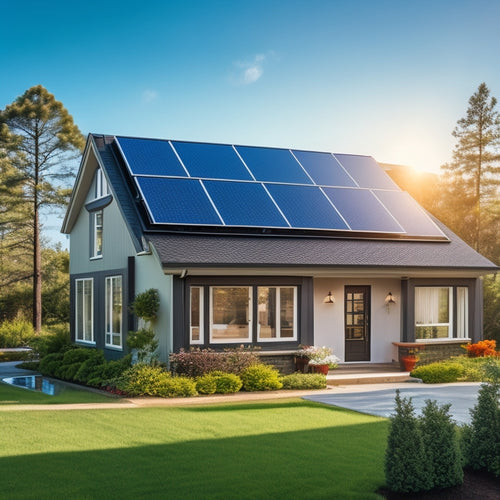
Why Homeowners Are Embracing DIY Energy Independence
Share
By taking control of your energy needs, you're breaking free from the uncertainty of utility bills and embracing a sense of financial freedom. With renewable energy, you're shielding yourself from grid fluctuations and rate hikes, while contributing to a sustainable future. As you explore DIY energy independence, you'll discover the benefits of tailored solar panel kits, efficient energy storage, and the empowerment that comes with making informed energy decisions. And that's just the beginning – as you take the reins of your energy needs, you'll uncover a world of possibilities that will change the way you think about energy consumption and personal freedom.
Key Takeaways
• Homeowners are embracing DIY energy independence to reduce their reliance on external energy sources and gain control over their energy usage.
• Switching to renewable energy sources, such as solar power, saves money by eliminating uncertainty of rate hikes and providing fixed costs for budgeting.
• Energy independence contributes to environmental sustainability, increases property value, and results in long-term savings on energy bills.
• A well-designed DIY energy system, including a suitable battery bank, allows homeowners to make informed energy decisions and achieve energy autonomy.
• By embracing DIY energy independence, homeowners experience a sense of personal freedom and control over their energy usage, driving a movement towards self-sufficiency.
Breaking Free From Utility Bills
By switching to renewable energy sources, you can break free from the constant drain of utility bills and start saving money that would otherwise be spent on powering your home.
The uncertainty of rate hikes and the shock of high bills can be a significant source of stress for homeowners. With traditional energy providers, you're at the mercy of fluctuating energy prices, leaving you vulnerable to bill shock. One month your bill might be manageable, and the next, it skyrockets, leaving you scrambling to adjust your budget.
By harnessing renewable energy, you can eliminate the uncertainty and take control of your energy expenses. Say goodbye to the anxiety of opening your utility bill, wondering how much it'll be this month. With renewable energy, you'll have a fixed cost, allowing you to budget with confidence.
You'll no longer be held hostage by rate hikes and bill shock, giving you the financial freedom to focus on what matters most.
Benefits of Energy Independence
You'll enjoy a profound sense of security, knowing that your energy independence shields you from the whims of the grid, protecting your wallet from price volatility and supply disruptions. With energy independence, you'll experience a reduced anxiety that comes with relying on an unpredictable grid. You'll be in control, making conscious choices about your energy usage and reducing your reliance on external sources.
Here are just a few benefits you can expect from achieving energy independence:
-
Environmental sustainability: By harnessing renewable energy sources like solar or wind power, you'll greatly reduce your carbon footprint and contribute to a cleaner environment.
-
Reduced anxiety: No more worrying about rising energy costs or unexpected power outages – you'll have peace of mind knowing you're in control of your energy needs.
-
Increased property value: Installing renewable energy systems can boost your property value and appeal to potential buyers if you decide to sell in the future.
- Long-term savings: With energy independence, you'll save money on your energy bills and avoid the uncertainty of rising utility costs.
Solar Panel Kit Essentials
To take the first step towards energy independence, you need to assemble a solar panel kit that includes the right components. Understanding what makes up a complete kit is essential to harnessing the sun's energy efficiently.
A solar panel kit should include high-efficiency panels, a charge controller, an inverter, and a mounting system. Panel sizing is important, as undersized panels won't meet your energy needs, while oversized panels will be a waste of resources. You'll need to calculate your energy requirements and choose panels that can deliver the necessary power.
Wiring considerations are also vital, as they affect the system's safety and efficiency. You'll need to make sure that your wiring can handle the voltage and current output of your panels, and that it's properly insulated and protected from the elements.
A well-designed kit will ensure that you can generate power efficiently and safely, giving you the independence you desire. By understanding these essentials, you'll be well on your way to harnessing the power of the sun and taking control of your energy needs.
Storing Excess Energy Efficiently
With a solar panel kit in place, your next step is to guarantee that excess energy generated during the day is stored efficiently for nighttime use or cloudy days, and that's where a well-designed battery bank comes in.
A Deep Cycle battery is ideal for this purpose, as it's designed to provide a steady flow of energy over a long period.
When selecting your battery bank, consider the following key factors:
-
Depth of Discharge (DOD): Ensure your battery can handle the daily charge and discharge cycles.
-
Battery Maintenance: Regularly check your battery's state of charge, voltage, and temperature to prolong its lifespan.
-
Efficiency: Opt for high-efficiency batteries to minimize energy losses during charging and discharging.
- Scalability: Choose a battery bank that can be easily expanded as your energy needs grow.
Empowering Homeowners With Choice
By having a well-designed battery bank in place, you're now empowered to make informed decisions about your energy usage and take control of your energy independence. You're no longer bound by the constraints of the grid, and you can choose when and how you use your energy. This newfound personal freedom is liberating, allowing you to live life on your terms. You're not beholden to utility companies or their rate hikes; you're in the driver's seat.
As you exercise your newfound energy autonomy, you'll likely find yourself connecting with like-minded individuals who share your values. Community building is a natural byproduct of DIY energy independence, as homeowners come together to share knowledge, resources, and best practices.
You'll find yourself part of a growing movement, one that's driven by a desire for self-sufficiency and environmental stewardship. By taking control of your energy usage, you're not only saving money and reducing your carbon footprint – you're also forging meaningful connections with others who share your vision for a more sustainable future.
Frequently Asked Questions
Can I Install Solar Panels on an Old or Historic Home?
"Just like the Wright brothers defied gravity, you too can harness the power of the sun on your historic home, ensuring Historic Preservation and Architectural Integrity, by carefully selecting solar panels that blend seamlessly into your roof's original charm."
How Long Does It Take to Pay off a DIY Solar Panel Investment?
You'll be thrilled to know that your DIY solar panel investment can pay off in 5-7 years, thanks to significant energy savings and enticing financial incentives, like tax credits and rebates, that shrink your break-even point.
Are DIY Solar Panels Compatible With My Existing Electrical System?
"Like a puzzle piece fitting snugly into place, your DIY solar panels will seamlessly integrate with your existing electrical system, especially if you opt for a grid-tie system, which harmonizes with your existing electrical infrastructure."
Do I Need a South-Facing Roof to Install Solar Panels Effectively?
'You don't necessarily need a south-facing roof to install solar panels effectively, but you'll want to take into account your roof's orientation and conduct a shading analysis to optimize energy production and guarantee maximum ROI.'
Can I Add More Solar Panels to My System in the Future?
"Imagine Sarah, who installed a 5-kW system, wanting to upgrade to 10 kW later. You can definitely add more solar panels to your system in the future, allowing for seamless system expansion and energy upgrading, as your needs evolve."
Related Posts
-

Top 10 DIY Conversion Kit Reviews and Tips
You're taking the first step towards electrifying your ride, and with the right DIY conversion kit, you'll be cruisin...
-

10 Best Ways to Purify Urban Air With EVS
You're looking for ways to purify urban air with Electric Vehicles (EVs). You can start by incorporating EVS Air Filt...
-

Solar Power Units Perfect for Homes
You're considering installing a solar power unit in your home, a decision that can notably reduce your reliance on tr...


